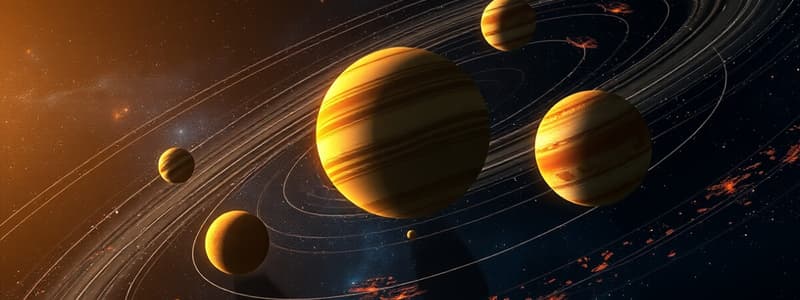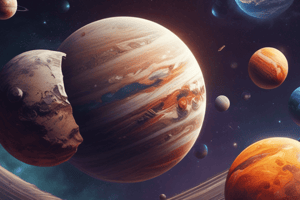Podcast
Questions and Answers
What significant event in space exploration occurred in 1969?
What significant event in space exploration occurred in 1969?
- The introduction of space probes
- The first astronaut living in space
- The first human visit to the Moon (correct)
- The launch of the International Space Station
What is the purpose of the International Space Station (ISS)?
What is the purpose of the International Space Station (ISS)?
- To serve as a probe for distant solar system exploration
- To allow astronauts to live and conduct research in space (correct)
- To explore the Moon
- To orbit the Earth without any human presence
What type of spacecraft have been used to explore distant areas of the solar system?
What type of spacecraft have been used to explore distant areas of the solar system?
- Amateur rockets
- Manned spacecraft
- Probes without people on board (correct)
- Space shuttles
Which statement is true regarding space exploration since 1969?
Which statement is true regarding space exploration since 1969?
Which of the following best describes space probes?
Which of the following best describes space probes?
What is the main reason humans have not traveled to any other planets in the solar system?
What is the main reason humans have not traveled to any other planets in the solar system?
How do the sizes of planets in the solar system vary?
How do the sizes of planets in the solar system vary?
What has improved over time to assist with human travel in space?
What has improved over time to assist with human travel in space?
What can be observed in the night sky when looking at celestial objects?
What can be observed in the night sky when looking at celestial objects?
What is the total number of planets in our solar system?
What is the total number of planets in our solar system?
Flashcards are hidden until you start studying
Study Notes
Human Space Exploration
- In 1969, humans first visited the Moon, a monumental event witnessed by millions.
- The International Space Station (ISS) allows astronauts to live and conduct research in low Earth orbit.
- Although probes have explored distant solar system areas, no human has set foot on other planets yet.
Size and Distance in the Solar System
- Earth is a small dot compared to the vastness of the solar system.
- The solar system consists of the sun, eight planets, and their moons.
- The planets are divided by proximity to the sun: inner planets are smaller, while outer planets are generally larger.
Properties of Planets and Moons
- Earth ranks as the third planet from the sun and is the fifth-largest planet in the solar system.
- Mercury is the smallest planet; approximately 18 Mercurys could fit into a hollow Earth.
- Jupiter is the largest planet, capable of holding over 1,000 Earths within its volume.
- Earth's only moon is approximately 49 times smaller than Earth if hollow.
Solar System Object Sizes and Comparisons
- The sun is the most massive object, with about 1.3 million Earths fitting inside.
- If the sun were a basketball, Earth would be the size of a grain of rice, and Mercury would be the size of a pinhead.
- Larger planets like Jupiter and Saturn would be roughly the size of table-tennis balls.
Moon Variations and Facts
- Jupiter has at least 63 moons, while Saturn has 62, with ongoing identification of new moons.
- Ganymede, a moon of Jupiter, is the largest moon, surpassing Mercury in size.
Conditions for Space Travel
- Planets far from the sun, like Uranus and Neptune, are too cold to support life; water exists only as ice there.
- Earth’s distance from the sun (about 149 million kilometers) allows for liquid water, crucial for life.
- NASA estimates a human mission to Mars may occur around 2030, pending the resolution of various challenges related to space travel.
Studying That Suits You
Use AI to generate personalized quizzes and flashcards to suit your learning preferences.




